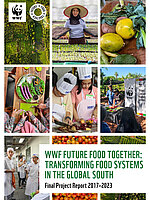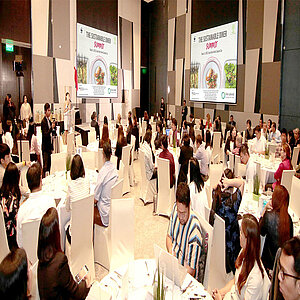Global Action Platform for Sustainable Consumption and Diets

What we eat and how our food is produced needs to be at the centre of global action.
Humanity’s chance of achieving the United Nations’ Sustainable Development Goals (SDGs) within the next decade will be largely determined by critical decisions over the next 12 months. What we eat and how our food is produced needs to be at the centre of global action. At the United Nations Food Systems Summit in September 2021 climate change, biodiversity loss, healthy diets, and livelihoods were discussed alongside food security.
However, many more high-level conferences will take place in the coming year - and if no concrete action is taken there, we risk missing the SDGs.
Food systems are the main cause of environmental degradation and human health problems. Food production takes up about 40 % of the land and 70 % of the freshwater withdrawn. It is the main cause of biodiversity loss and is responsible for about 30% of greenhouse gas emissions. Overall, food production poses a serious risk of morbidity and mortality. These facts are well documented in the scientific literature, but except at the UN Summit on Food Systems, food is not a priority topic for discussion or negotiation at major summits.
However, we cannot rely on nature-friendly production alone. To feed a growing population within planetary boundaries, we also need to reduce food loss and waste and change our consumption habits and dietary patterns. Changing our food habits plays an important role in achieving the SDGs and has been identified as the most important way to reduce greenhouse gas emissions from our food systems.
Connecting the dots
Many passionate and committed stakeholders are already making considerable efforts to advance the issue of consumption and nutrition. However, many of these efforts are isolated, meaning there is no coordination between major health and environment summits. To make an impact, we need to start connecting the dots between stakeholders, actions and summits. Consumption and diets must be included in the new global biodiversity framework and Nationally Determined Contributions (NDCs) under the Paris Agreement. There is still time to act.
To start connecting the dots, WWF has launched the Global Platform for Action on Sustainable Consumption and Diets. This platform brings together key stakeholders working to transform food systems. It aims to build a coalition committed to maximising collective impact during the Super Year of Food. Only by linking biodiversity, climate and health agendas can we truly achieve our global goals. Over the coming months, the Platform for Action will discuss strategies and coordinate actions ahead of and during the upcoming major summits.
Platform setup
The platform emerged from WWF's IKI project on Sustainable Consumption and Production (SCP). One of the project's work packages focuses on international policy work so that project approaches and solutions are communicated as best practice examples at the international level in order to replicate and scale them up.
The platform was established to serve as a bridge between the various relevant international events and the community of practice on sustainable consumption and diets, bringing together a wide range of stakeholders from numerous organisations and civil society. Articles written by several members of the group are published in parallel to the virtual meetings, each of which has focus topics and is specifically geared towards upcoming important global conferences.
For more information please see here.
The link has been copied to the clipboard
Contact
IKI Office
Zukunft – Umwelt – Gesellschaft (ZUG) gGmbH
Stresemannstraße 69-71
10963 Berlin








![[Translate to English:] Cover Beyond research: Nachhaltigkeit im Food-Service-Sektor](/legacy/Bilder/2020/20200707_Cover_Beyond_research.jpg)

![[Translate to English:]](/legacy/_processed_/f/5/csm_20200911_organic_agriculture_in_Nan_province_e0f204d31c.jpg)


